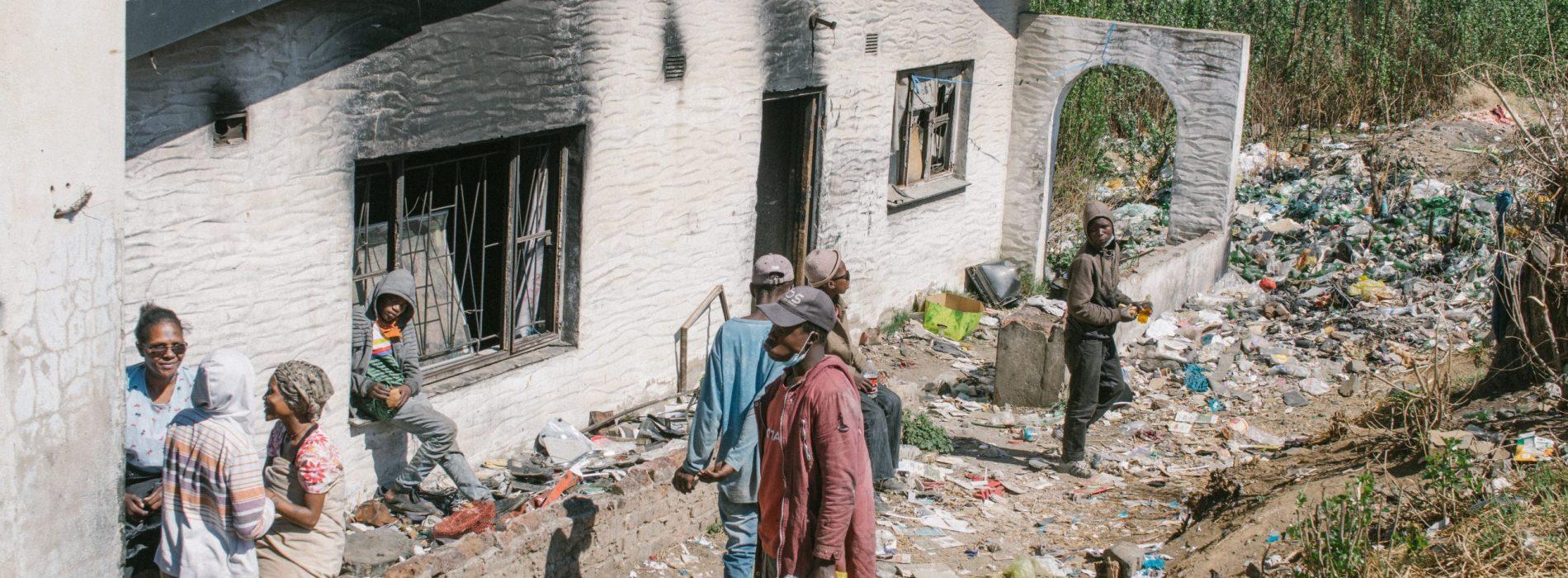Africa-Press – Lesotho. IT once stood beautifully behind the main Shoprite store along Kingsway, Maseru’s main street. But today, the house that the late ’Makhopotso Lebona, a Basotho National Party (BNP) heavy-weight, used to take pride in has become a den of drugs and a haven for runaway juvenile delinquents.
The house, entered into the Lesotho properties registry in 1992, can now easily be mistaken as part of the Maseru city rubbish dumpsite. More than 20 children with different stories to tell about their life experiences, including abuse by parents, have taken over the residence, which they now call “The White House.
”
Others just run away from home because they disdain parental discipline while some are from rural areas and were lured by the bright lights of the city.
On a recent day, children as young as 12 sniffed glue. Some, wearing tattered clothes, puffed rolls of marijuana. Others were knee-deep in garbage, foraging the heap for food and anything useful.
There are about 20 boys aged between 12 to 17 years and some young men in their early 20s. Five young women aged between 19 and 22 complete the set of the new occupants.
A couple with a six-month-old daughter used to share the house but has since moved out to rent a house in Motimposo, about seven kilometres north east of the city centre.
“We cannot raise a baby in such a filthy place,” said Tšenola and Mosela-Ntja.
At the drug den, occupants looked like they had not bathed in weeks, the white walls are soot-scorched and a foul smell emits from the surrounding garbage.
One of the boys, whom we shall call Lebohang to protect his identity, admitted that he does not know when he last had a bath. Offered some money, the children tasked Lebohang to go and buy bread at a nearby supermarket.
He looked at himself and refused. “You know that I’m not allowed in there,” Lebohang said, turning his face away. An older boy took the money and rushed to the supermarket, quickly returning with loaves of bread and a powdered drink which they shared.
“We haven’t had breakfast,” one of the boys said after eating his share.
He reached for his back pocket, pulled a plastic sachet with marijuana and carefully selected the seeds out before rolling a joint. The boys formed a circle and the joint was passed around.
Others preferred cigarettes. “I don’t smoke marijuana, I don’t want to go mad,” said another boy, adding that he doesn’t drink alcohol nor sniff glue.
The boys tell harrowing stories of life in the streets of Maseru, far away from the comfort many children their age get in their families where parents take care of them.
Another boy, 16-year-old Thabang, said he arrived in Maseru from Koro-Koro Ha-Mofoka, about 30 kilometres south of the capital city, three years ago after fleeing abusive parents.
Thabang was not comfortable talking about what happened between him and his parents but said his father was more abusive than his mother. “He would tell me I am not his son.
He used to beat me until one day I decided that enough was enough,” the boy said. “I ran away and came to Maseru. ” He knew no one in the city so he slept in a shack made up of plastic and cardboard boxes that he shared with other street kids.
He said the constant fights in the street made him uncomfortable and luckily one of the street kids introduced him to the group living in Lebona’s house.
“The boy found peace here. We don’t fight among ourselves, we take care of each other,” said a 20-year-old Leloko in between puffs of marijuana.
“It’s just that sometimes guys from the street, those living around the Mafafa area, in particular, come here to attack us but we fight back,” he said.
“One of our boys was killed there near Mafafa. It’s because sometimes when they have beaten up one of us we go there to fight, to revenge.
”
Among those staying in the house are three couples who have selected a room, cleaned it and made it their own love nest, often all of them having sex at one go.
Asked how they make love in the presence of others, one of the men said: “Like we are in a race, each couple trying to win the competition. ”
Inside their room, each couple has a corner with neatly looked after mattresses.
In another room stays a 60-year-old man, the area papa, who seems in charge. Sitting by a make-shift stove warming bathwater, with a cigarette in one hand and a knife in the other, he denied thepost crew permission to enter his room.
The old-timer says his job is “to ensure that the boys and girls arriving here are safe”. “Many times they don’t listen to me but I try all I can to bring orderliness to this house,” he said, adding that he has been living in the house “for a long time” even before it caught fire.
“I have seen many come and leave. It’s just that I see them as my own children and I try to give them street wisdom so that they don’t engage in criminal activities,” he said.
Asked if there are cases of rape reported at the house, he said: “Not here. It will not happen here because we protect each other. ”
About a kilometre away, another house has become home to a group of sex workers.
Situated along Mpilo Boulevard, opposite the government complex in the north and MGC Business Complex in the south west, the house is made from concrete blocks and has no windows or doors.
Here thepost found a young woman of 22 and a child of 17, both of whom have sexually transmitted diseases. The older one openly talked about living with HIV.
“All I need now is food,” she said, sitting at the door of a caravan parked near the house. She said three girls were sleeping in the caravan with a man who is their “protector”. “He doesn’t have sex with any of us.
He just protects us,” said the woman, whose health is clearly deteriorating and parts of her skin are peeling off. “My feet are cold,” she said, scratching her thighs. The 17-year-old said she is tired of living rough and wants to go back to an orphanage from where she escaped.
The girl, seemingly embarrassed when asked if she is selling sex, said she does not have money for food because she stopped sex work after discovering that she had contracted a sexually transmitted disease.
“I am now taking pills I got from the Katlehong Clinic,” she said, adding:
“The problem is I take them on an empty stomach.
”
The girl begged for help from the Ministry of Social Development to take her back to the orphanage.
“I will stop smoking and drinking,” she promised, tears swelling in her eyes. The house, which they say accommodates eight more sex workers who cannot afford to rent houses, belongs to the government.
Cabinet Information Officer, Khopotso Phafoli, said the government plans to demolish the house because it’s in a bad state and people living there are in danger.
“It is not the only house in that state that belongs to the cabinet,” Phafoli said, without being specific when exactly the house will be demolished.
“They are still weighing their options on how they will go about it,” she said. She said the office is aware of people staying at the house because officials conducted random visits to the house.
“They often found girls during their visits so they were not really sure whether they stayed there with boys.
They were interrogated on how they got there and some refused to talk while others said they came of their own accord. They were informed about the pending demolition and instructed to leave” she said.
“There should have been a random check by the police to ensure that they leave the place. Not just this specific house but others as well.
”
She said this will help to establish the method of intervention needed for those children “not forgetting that street kids are everywhere”.
“We have to ensure that they leave the place bearing in mind that they leave to a safe house, working collaboratively with all stakeholders. It will not be a wise move to remove them haphazardly. That’s not justice,” said Phafoli.
The Ministry of Social Development Manager for Child Protection, ’Mantoa Sejake, said the ministry’s mandate is to protect any person in danger. The ministry works with partners such as government ministries, Non-Governmental Organisations or individuals.
She said the Children’s Protection Act states that a child is anyone below 18. “At that age, they don’t have the responsibility in a way and rely on other people for survival and we don’t have a choice but to intervene, either ourselves or through our partners,” Sejake said.
“Action has to be taken.
”
“Every child has to grow in the family yard either theirs, neighbours’ or relatives’ but there should be someone who takes responsibility for that particular child.
If that’s not the case then it’s not normal hence the need for the ministry to intervene. ” Sejake said there are several reasons that lead to children ending up on the streets.
Abuse, extreme poverty and lack of supervision are some of the reasons. She said once a child is identified as needing help, they check the child’s history.
“(Social workers) do so through report writing.
At times we realise that there is a problem at home which can be solved but sometimes it’s not solvable hence such children are taken to care facilities.
” She said caregivers are also approached to help.
“It takes counselling sessions to ensure change as behaviour is learnt hence it has to be unlearnt if it pushes children outside their homes.
”
She said people are unique in their own way and problems will appear if they are not supervised.
“We will not perform magic alone to solve the problem, clients also have to help themselves because we will not succeed without the other party’s support regardless of how hard we try,” said Sejake.
She said relatives of orphans sometimes are a challenge. “They lack compassion and we fail to reunify the child with the family,” she said. “The longer a child lives in the street, the more they learn the behaviour there and returning home won’t be easy.
”
She said such children “want to be in a lawless society and it gives us a problem”.
“Living in the street shows the urgent need for our service.
But how do we monitor if children are not back in the family? We are not able to do that; it is indeed difficult without the support of the client. ”
She said they strive for family reunifications.
“Almost all of them, we knew them the moment they showed up on the street and tried to intervene but we fail because the person has to accept their problem.
”
She said they deal with street kids cases on a daily basis.
“We feel for them and still help regardless of how they dealt with us in the past. We still try to help them because we are so desperate for them to leave the street,” said Sejake.
She said some get addicted to life on the streets and find it difficult to stay at home. “Despite the comfort at home, they still miss being in the street and prefer staying there as they depend on drugs.
”
She said they don’t encourage people to give handouts to children on the street.
“We have to limit giving them things that attract them. Let’s not give them handouts when they are on the street as this encourages them to stay there. That’s not what we need,” said Sejake.
The SOS Children’s Village’s website says there are over 200 000 orphans in Lesotho. A study by UNICEF shows that “Lesotho has a relatively young population with nearly half of all inhabitants under the age of 18”.
The study builds on the indication that understanding the complexity of child poverty and children’s deprivation is essential to addressing the needs of children through suitable programmes and policies.
The study says the orphanhood rate among children aged 5–17 hits a staggering 48 percent, and only 51 percent of girls and 35 percent of boys aged 13–17 attend secondary school.
“The Basotho children represent a vulnerable population that deserves special attention,” the UNICEF study reads.
Sepheo, an organisation helping children living in the streets, says children who come to the street are poor, “but money alone does not usually cause a child to end up on the streets”.
“Social factors are the biggest cause of children coming to the streets in Lesotho,” Sepheo says on its website.
“Approximately 60% of children/youth that Sepheo moved off the streets initially came in response to social factors,” it says.
For More News And Analysis About Lesotho Follow Africa-Press






